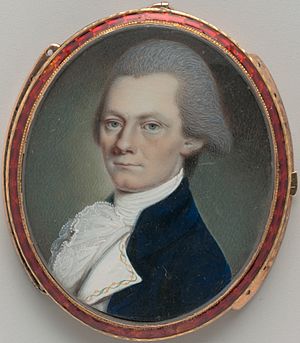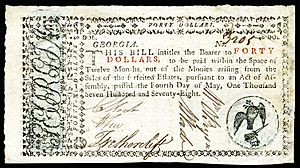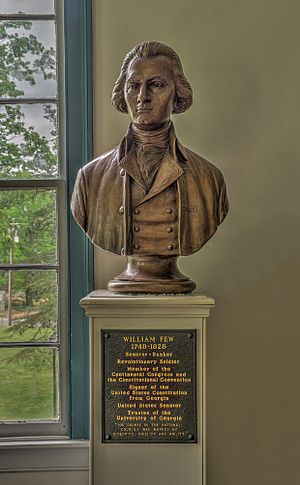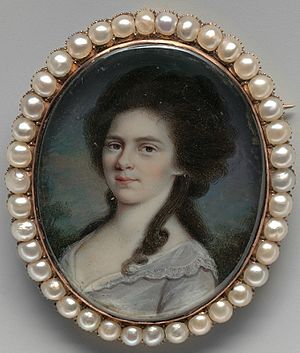William Few facts for kids
Quick facts for kids
William Few
|
|
|---|---|

portrait by John Ramage
|
|
| United States Senator from Georgia |
|
| In office March 4, 1789 – March 3, 1793 |
|
| Succeeded by | James Jackson |
| Delegate from Georgia to the Confederation Congress | |
| In office 1780 – 82, 1786–88 |
|
| Personal details | |
| Born | June 8, 1748 Baltimore County, Maryland |
| Died | July 16, 1828 (aged 80) Fishkill-on-Hudson |
| Resting place | Saint Paul's Episcopal Church Cemetery, Augusta, Georgia |
| Spouse |
Catherine Nicholson
(m. 1788) |
| Children | 3 |
| Signature | |
William Few Jr. (born June 8, 1748 – died July 16, 1828) was one of the Founding Fathers of the United States. These were important leaders who helped create the country. He represented the state of Georgia at the Constitutional Convention. This was a big meeting where leaders wrote the U.S. Constitution, which is the main set of rules for the government. William Few signed this important document. He and James Gunn were the very first Senators from Georgia.
William Few grew up in a family of small farmers. Even though his family wasn't rich, he became a very important person in politics. He was good at taking care of himself, which was important for people living on the American frontier. He also became friends with many powerful political and military leaders. William Few was mostly self-taught, meaning he learned a lot on his own.
His experiences in the American Revolutionary War helped him become a strong leader and organizer. These skills were very important in the southern parts of the war, where there was a long and tough fight against the British. William Few cared a lot about helping others. His natural talent for military matters quickly got the attention of the Patriot leaders. The Patriots were the Americans fighting for independence. They soon gave him important political jobs too.
The war changed how William Few thought about the future of the new country. He started as someone who valued individual freedom on the frontier. But the war made him realize that a strong central government was needed to protect everyone's rights. This belief became a key part of his long career in public service.
Contents
Early Life and Challenges
William Few's family came from England. His ancestors were Quakers, a religious group. The Few family lived in northern Maryland and grew tobacco. In the 1750s, several droughts made it hard for them to farm. So, the Fews and their relatives decided to move south to find better land.
The Few family eventually found success in Orange County. Like many other settlers in the western areas, they got involved with the Regulator Movement. This was a group of farmers who were unhappy with the rules and taxes set by richer people and politicians from the eastern parts of the state. In 1771, the protests turned into a fight at the Battle of Alamance. The farmers, who were mostly unarmed, lost badly to the North Carolina militia. William Few's brother, James, was executed for his part in the uprising. The family farm was also destroyed. This event made William Few think a lot about capital punishment. The rest of his family moved to Wrightsboro, Georgia, and William stayed behind to sell their property.
Later, the problems within North Carolina started to fade as Americans became angry with Great Britain. New taxes and rules from Britain made both the eastern landowners and the new settlers upset. They felt these rules went against their idea of self-government. Patriot leaders were able to unite everyone against what they saw as a threat to their freedom.
William Few was one of the first people to join the volunteer militia, called "minute men," in Hillsborough. He learned military tactics from a former British soldier. In 1775, he turned down an offer to be a captain in the Continental Army because he had family business to finish. But the next year, after settling his family's affairs, he moved to Georgia. There, he started a law office and quickly used his military knowledge to help the Patriot cause in his new state.
Fighting for Independence
Georgia organized its citizen-soldiers by area, forming local companies into regiments for each county. William Few joined the Richmond County Regiment, which his older brother Benjamin led. For two years, Few trained his friends and neighbors in military skills he had learned. In 1778, Few was called to active duty when Georgia was threatened by British soldiers and Loyalists from Florida. Loyalists were Americans who supported the British.
Georgia's first military campaign didn't go well. American forces stopped an enemy attack near Sunbury, but their counterattack failed. William Few, leading a company of Georgia Militia, saw the army's supplies run out and the soldiers get sick. Only half of the American soldiers made it home. Later that year, British forces captured Savannah, Georgia, and destroyed many American units. However, armed resistance continued in western Georgia, led by the Richmond County Regiment. In 1779, Few's regiment often fought with British units, eventually forcing them to leave Augusta, which they had captured earlier.
The success of these citizen-soldiers in defending their homes began to change the war in Georgia. The American commander, Major General Benjamin Lincoln, decided to attack. Lincoln combined his American soldiers and militia from Georgia and South Carolina with French forces to surround Savannah. However, they had trouble working together. The French wanted to finish quickly, so they convinced Lincoln to launch a direct attack. This led to a bloody defeat. But Few's militiamen helped protect the American units as they retreated. After the battle, his regiment was sent to the frontier. There, the Creek Indians, thinking the Georgians were weak, had started supporting the British.
The British operations in Georgia in 1779 were part of a new plan to conquer the southern colonies. William Few's military service in the later years of the war was very important in stopping this plan. The western forces, including Few's regiment, prevented the British from fully controlling Georgia. The area never became a safe base for Loyalists. British troops needed for other battles had to be sent to fight the frontier militia. Few became a skilled administrator and expert in getting supplies. He also became a brave and clever commander. He learned to be patient, save his forces for important attacks, and choose the right time and place to defeat small enemy groups without risking his men too much. He also showed great physical strength, which was needed to survive the tough life of guerrilla warfare.
A Leader for the New Nation
William Few's military success went hand in hand with his political work. In the late 1770s, he was elected to the Georgia House of Representatives. He also served on the state's Executive Council, worked as the state surveyor-general, and helped Georgia negotiate with Native American tribes to reduce attacks. He was also a senior judge in Richmond County. Because of his growing political importance and leadership skills, the state legislature chose him in 1780 to represent Georgia in the Continental Congress. This became the Congress of the Confederation after the Articles of Confederation were approved a year later.
Few served in Congress for less than a year. After General Nathanael Greene successfully drove the British out of most of Georgia, Congress sent Few home to help put Georgia's government back together. Once this was done, Few returned to Congress in 1782 and served there for most of the next decade. While in Congress, his state also asked him to serve at the Constitutional Convention in Philadelphia in 1787. Because he had to split his time, he missed some parts of the convention. However, Few strongly supported creating a powerful national government. He worked hard to get the Continental Congress to approve the new Constitution. He also participated in the Georgia meeting in 1788 that approved the document for the state.
Georgia quickly chose William Few to be one of its first United States senators. In the Senate, he was against creating the First Bank of the United States. He planned to retire from politics in 1793, but his neighbors asked him to serve another term in the state legislature, and he agreed. In 1796, Few was appointed as a federal judge for the Georgia area. During his three years as a judge, he became known as a fair and practical judge. He also strongly supported public education. He was one of the founding trustees of the University of Georgia (UGA) in Athens in 1785. Few's efforts to establish UGA as the first state-chartered university showed how much he valued formal education, even though he was self-taught.
He was a strong opponent of the famous Yazoo land scandal, which was a big land fraud. Even though his political enemies tried to connect him to it, he was against it.
In 1799, William Few moved to Manhattan, New York, at his wife's request. There, he continued his public service while supporting his family through banking and practicing law. He became president of the City Bank of New York, which is now Citigroup. He held this position until 1817. His new neighbors elected him to represent them in the New York State Assembly from 1802 to 1805. He also served as a city alderman from 1813 to 1814. From 1802 to 1810, he was New York's inspector of prisons. In 1804, he became the United States Commissioner of Loans. Few retired in 1815 to his country home in Fishkill, New York, where he passed away on July 16, 1828.
Later Life and Legacy
William Few died at age 80 in 1828 in Fishkill-on-Hudson (now Beacon, New York). He was survived by his wife, Catherine Nicholson, and three daughters. He wrote his life story for his daughter, Frances. He was first buried in the yard of the Reformed Dutch Church of Fishkill Landing. In 1973, at the request of the state of Georgia, his remains were moved and reburied at Saint Paul's Church in Augusta, Georgia.
James Marshall, another important person, once said about William Few, "He was one of those men, 'few and far between,' who effect more by solid weight of character than many can by eloquent speech or restless action." This means Few achieved a lot through his strong character rather than just talking a lot. Few Street in Madison, Wisconsin is named in his honor. The William Few Parkway was built near his old home in Columbia County, Georgia.
 | Roy Wilkins |
 | John Lewis |
 | Linda Carol Brown |




